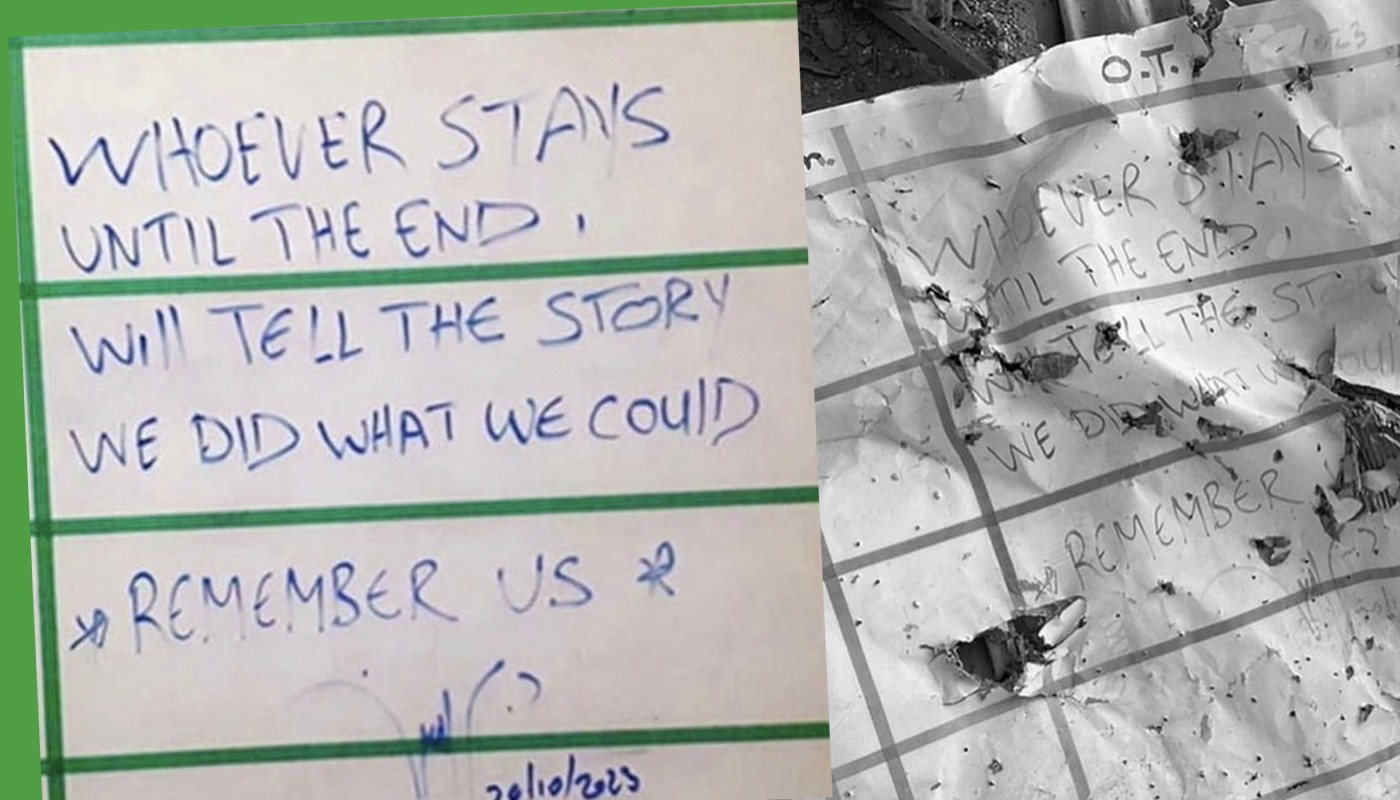“Whoever stays until the end will tell the story. We did what we could. Remember us.”
Dr. Mahmoud Abu Nujaila wrote these words on a whiteboard in Al-Awda Hospital on October 20, 2023, one month before he was martyred in an airstrike while treating patients. This edition of The New York War Crimes is, above all, a tribute to those who stayed: the living, the martyred, and the disappeared. This issue aims to represent the substance of their convictions — from reports and analyses of Zionist terror to testimonies, poems, and songs of resistance, altogether reflecting the role of Gaza’s medical workers as a bulwark against death and despair. Their courage is a north star for healthcare workers everywhere, a call to discard shallow humanitarianism for principled action against the systems of oppression that degrade health and extinguish life.
For 15 months, we have witnessed Zionists pursue the systematic and calculated destruction of all healthcare infrastructure in Gaza. We have witnessed children reciting scripture to bear the pain of surgery without anesthesia; patients with IVs in their arms immolated in tents outside incinerated hospitals; the decomposing bodies of premature babies; the uncovering of mass graves filled with corpses wearing scrubs and patient gowns. Every hospital has come under fire of snipers, drones, tank shells, and airstrikes; at the time of this writing, half have been restored by Palestinians to partial functionality. The Israeli Occupation Forces have kidnapped, tortured, and murdered hundreds of the doctors, nurses, medics, and medical students who embody the last line of defense — not of the self, but of the people, the land, and life itself.
The Zionist entity insists on dismantling the entire life-saving apparatus because its very existence thwarts their settler-colonial mandate. As long as Palestinians are kept alive, whether by armed fighter or by healthcare worker, the Zionist project cannot win. “We are a small brave nation,” Ghassan Kanafani said of Palestine in 1970, “who will fight to the last drop of blood to bring justice to ourselves after the world failed in giving it to us.”
The world’s failures have rarely been so profound. As Gaza’s entire healthcare sector lies in ruins, the American medical establishment aligns itself with the genocider. At best, it feigns political neutrality. At worst, it actively suppresses voices advocating for Palestinians and recommits support to the Zionist colony through financial investments, research partnerships, and academic exchange programs. It is no surprise that the exposing of a racial ethnostate threatens the American medical establishment, steeped in a history of scientific racism and eugenics. Decades of American physicians forcibly sterilized tens of thousands of poor, native, Black, brown and disabled women, a practice lauded and adopted by the Nazi regime. While centuries of racialized domination, increasing wealth inequality, and ongoing residential and environmental segregation inevitably lead to poorer health outcomes for the marginalized, access to life-saving health services have and continue to be segregated along these same lines. American healthcare workers are employed as the front-line keepers of these oppressive hierarchies, prescribing life and death at the behest of empire and capital, while insurance companies sit atop like vultures, making a killing off of the dying.
What, then, does it mean to be a healthcare worker in the heart of empire, laboring for a system invested both in the slow death of a racialized population at home and in the Zionist decimation of health in Palestine? How can we organize a healthcare workforce in active solidarity with Palestinian liberation and, by natural extension, the liberation of all oppressed peoples? To start, healthcare workers of conscience must reject our assignment as keepers of the hierarchy — refusing engagement with carceral systems, aligning ourselves loudly with the marginalized, and demanding our employers and institutions boycott and divest from the war machine. Moreover, we must be willing to take collective risk and put our bodies on the line — at the offices of weapons manufacturers, in the halls of imperial power — anywhere and everywhere the economy of death rears its head.
In our interview with Samy, an occupational therapist who helps the wounded, disabled, and debilitated in Gaza return to the activities of daily life, we asked what the international community could do to support healthcare in Gaza. “The only solution, and I’m speaking to the whole world, is for the United States to stop the killing,” Samy told us. “We are being killed with American weapons. The change must come from the American people. The will of the United States must change, the direction of its compass must shift, or believe me, the entire world will burn because of it.”
Gaza’s healers, past and present, have lit the path forward. Their principled care for their patients and communities fundamentally opposes the exterminationist project of colonization, and resists the ongoing Nakba. In the aftermath of a ceasefire, the healthcare workers of Gaza undertake the liberatory and revolutionary project of surveilling the full extent of the entity’s destruction and rebuilding the life-sustaining apparatus — reckoning with the more than 100,000 injured Palestinians, at least a quarter of whom will require rehabilitation for life-altering injuries; a poisoned water and sanitation infrastructure, which will continue to cause infectious disease for years to come; and the profound psychological impact of 15 months of genocide exacerbating years of siege and occupation, manifested by the unthinkable reality that, according to a study conducted by a Gaza-based NGO, over 50% of children in Gaza wish to die.
The fight is far from over. As Dr. Fayez Rashid wrote in his 1982 memoir of the siege of Beirut, The Wounds Bear Witness, the strongest weapon against systems of oppression is “our faith in the justice of our cause.”
Issue 15 of the New York War Crimes is out now.


